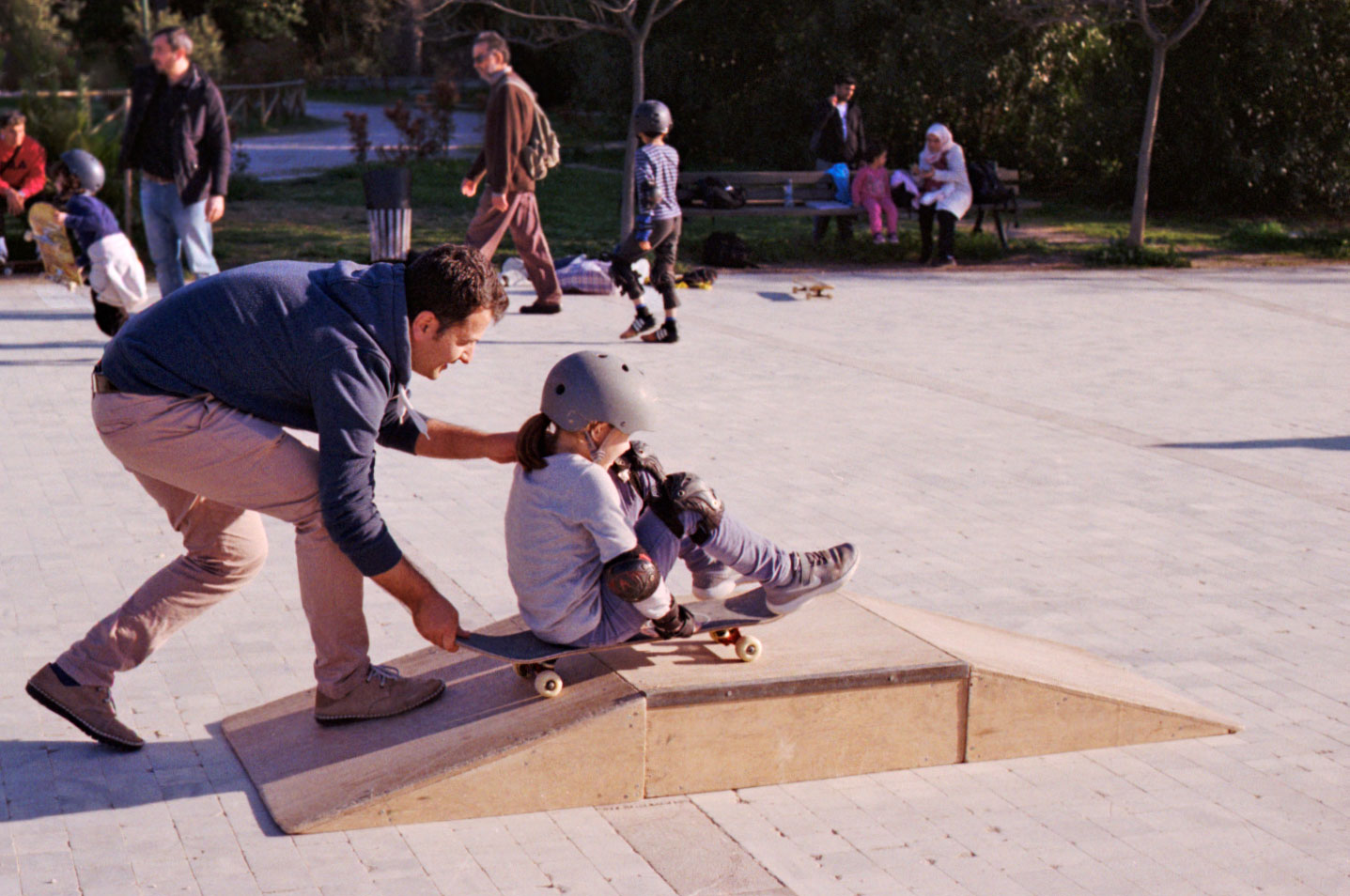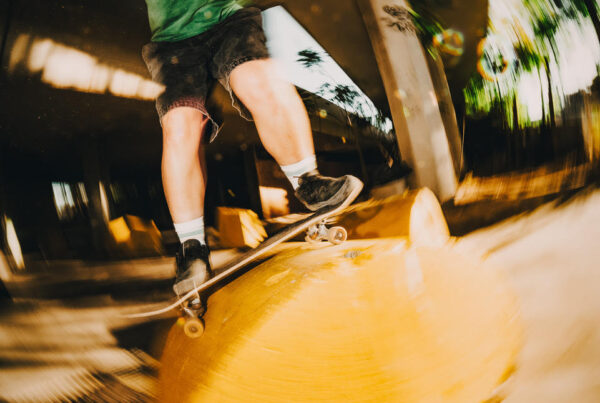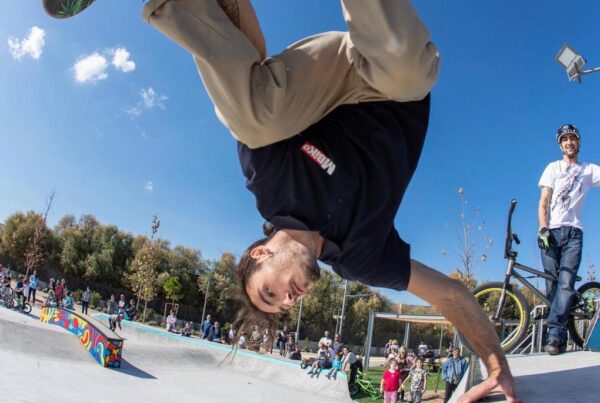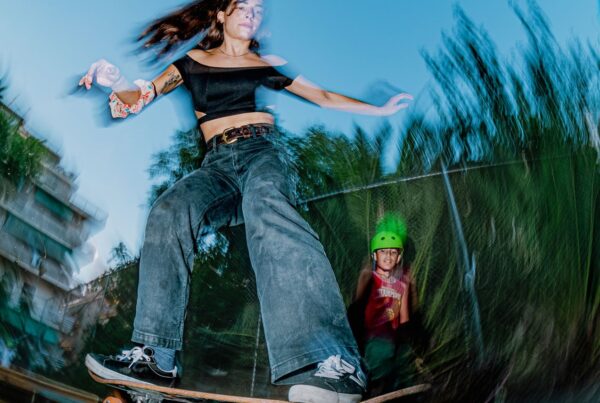It’s been one month since we attended Pushing Boarders in Malmö, Sweden, so we thought we’d put together some of our reflections from the event now that we’ve had some time to digest everything. It was a busy event with panel discussions focusing on race, gender, allyship, education, nonprofits, corporations, international and local communities, technology, design, architecture, and the ‘gaze’ of journalism/media. Whilst writing this I realised there are quite a few threads of conversations from PB I want to reflect on, so I’ve decided to write separate posts for them. In this one I am focusing on mental health and ‘speaking up’. This was the overarching topic of this year’s event but one that we believe could have been addressed in more practical/solution-based way. This is a call to action – a way to continue the discussion and invite further suggestions for pushing things forward.
Skateboarders love talking – whether it’s on top of a mini ramp or at a street spot – we talk and talk and skate and skate. This is what Pushing Boarders is founded upon. Something especially interesting, which was brought to my attention by my dear friend Elin whilst volunteering with us here in Athens, is that skateboarding allows for you to ‘skate away’ from a conversation at any point. In no other situation would that be deemed a normal act of behaviour – and this seems especially significant to me. It allows for people to dip in and out of conversations, to delve into things, but with an easy escape; inviting a freedom of expression that might be hard to find in other circles. This is something Joel Pippus also focused on in his presentation at the Good Push Alliance meeting. Joel works as a counsellor at Hull Services in Calgary, Canada. Part of their pioneering research, using the Neurosequential Model of Therapeutics, examines the effects of skateboarding on the healing process of young people who have experienced past trauma. Joel states that the social milieu of the skatepark – interacting with peers, cheering each other on – is an integral part of the benefits skateboarding can have for young people. The environment invites interactions, but also provides the security of focusing on an activity whilst socialising, and most importantly; the opportunity to ‘skate away’ from a conversation at any point.
Pushing Boarders acknowledges that these interactions are progressive and important, and with this comes the recognition that skateboarding – on it’s own – is not the beacon of inclusivity that it could potentially be. Certainly an acceptance that the dialogue within skateboarding culture has previously been dominated by just a few prominent voices. As an event, PB takes that discussion you might be having on top of the mini ramp and puts it in a room filled with a diverse group of people – people from many different countries, different cultures, people who work in the industry, in the media, people from social skateboarding projects, nonprofits, professional skaters, people who have skated all their lives and people who just picked up a board – all with a common thread: the desire to push the dialogue of skateboarding culture in a direction that is more inclusive, more self-critical and self-realising, more willing to challenge itself and its current status and values. It was a chance to address people from the industry – from magazines and other media outlets – and tell them how to be more inclusive; recognising that it is our collective responsibility to do so. At least the willingness from many people is there, but let this be said – if you haven’t been including women, non-binary or trans people in your magazine then that’s not just going to change overnight. You have to reach out to these marginalised communities, because they are there and they are thriving.
‘Often the culture of skateboarding — dictated almost exclusively by middle-class cisgendered white men — doesn’t allow that much space for people who don’t look or live like them. It routinely cool-guys many people out with a “shut up and skate” attitude before they even get to begin. That attitude is what has made skateboarding inaccessible to so many people — namely women, LGBTQ+, gender non-conforming people, trans people, and many people of color, who are not afforded safety or acceptance within the community itself.’ (Adam Abada, Quartersnacks)

As I’ve mentioned, the underlying theme of PB this year was mental health in skateboarding, and this was addressed briefly on many of the panels as well as in the opening talk of the event, ‘You Can Talk to Me’, by John Rattray and Madeleine Uggla. They shared their personal experiences of depression and losing people close to them through suicide – urging skateboarders to speak up about these issues. I guess we can look at this ‘speaking up’ in a few different ways here – as a call for a more diverse ‘voice’ of skateboarding; a demand for media outlets to give voice to those people who have not been heard in the mainstream up until this point. Calling each other out* and establishing better allyship between skateboarders of different nationalities, who identify in different ways. Then hopefully through this diversification, we can move in the direction of creating support networks for those people who are struggling within themselves, encouraging them to share their problems and inviting others to do so as well.
Amber Edmondson (Free Movement Skateboarding, Women Skate the World) took the opportunity on her panel (‘The Revolution will not be Patronised’) to push the discussions on mental health and wellbeing further: stating that she herself needs help, as well as many other people involved with social skateboarding projects worldwide. We’re all totally invested in what we do, with little/no external support, trying to make our work emotionally and practically sustainable, but oftentimes struggling to do so. And if we do really want to move in the direction of making positive change then we need to lay down our vulnerabilities and ask for outside help – because we can’t always provide that for ourselves. After Amber’s panel discussion she was approached by quite a few people from diverse positions and backgrounds; professionals in the field of therapy and counselling, as well as many people who could relate to her words, who were reaching out for help too.
‘I just want to say a little note on the dark side of social skate work and working with people who have been through trauma and living in that space every day. I’m not a refugee and I don’t have to go through anything compared to them, but It is really hard – and if we’re in a space here where we’re saying we all need to be talking about it and we all need to ask for help when we need it – I am struggling and I do need help.’ (Amber Edmondson, Pushing Boarders)
So as not to be vague – we are speaking now from our personal experience of working here in Athens, about issues that affect ourselves as well as many other people working for social skateboarding projects operating within contexts that have experienced war, conflict, poverty and disaster. The reason we are working in these contexts is because we all believe that building a skateboarding program can go a little way towards improving the physical and mental wellbeing of young people who might not have the opportunity to engage in other skill-developing, joyful and meaningful activities. The topic of international support for local communities is something to be addressed in a separate article, but what we’re talking about here is how to make this work emotionally sustainable for the people who put their whole being into establishing projects that they feel have a positive impact on many people’s lives. Something I struggle with personally is how much my role running a charity organisation is romanticised by other people – often people who don’t understand the context I work in or what I really do day-to-day. It can seem from the outside that we get to spend all our time teaching skateboarding and sharing the love of it with young people from all over the world. Why then are we all constantly so stressed and struggling to maintain our own mental health whilst simultaneously advocating for the wellbeing of others? It speaks for the reality of the situation here in Athens, in Greece, and the wider humanitarian crisis that we are experiencing worldwide.
On the ground, we work with people who have most likely experienced severe levels of stress and trauma in their short lives, and on top of this the socio-political climate in Greece is worsening all the time. The recently elected government, New Democracy, has bull-dozed into their position of power with multiple squat evictions; leaving hundreds, probably thousands of people homeless and children with no access to education, let alone medical treatment and asylum interviews. The numbers of people arriving today (more than 31,000 in 2019 alone) rival that of 2015 and the rate doesn’t seem to be slowing. Financial support for organisations such as ours is not easy to come by; many crucial projects and services have lost funding, and we are losing the spaces we use to teach our sessions due to severe overcrowding in the refugee camps. The new right-leaning government makes our search for a permanent space even harder as they are unlikely to grant us the use of their land in order to benefit the refugee and asylum seeker communities. What we would like to be focusing on is developing our educational programs so that the services we offer allow the young people we teach to learn more than just skateboarding skills – so that they can develop leadership skills, gain training in things such as first aid, but often the majority of our time is spent searching for ways to make it possible for us to continue the work we do.

What we need to establish moving forwards is a network of professionals who can provide support to people working in social skateboarding projects worldwide, offering their expertise for individuals/organisations who don’t have the financial stability to secure this kind of support otherwise. Could this perhaps be established through better links between nonprofits and the skateboarding industry? With companies or brands taking the social responsibility to better support the skateboarding charity sector worldwide? In many other disciplines, humanitarian work in the field is seen as a massive bonus on job applications – what if the industry valued social skate work in a similar way? We’d like to hear people’s opinions on this, and invite you all to comment below. A first step could be the creation of a job role for one or two people – to coordinate a support network of professionals who can offer counselling/therapy, either online or in person, to those that really need extra support to sustainably continue the work they are doing. And then from this, we could move on to establish an online platform where people can volunteer wider skill sets, knowledge and expertise; be it legal advice, data analytics, web design, marketing, management training etc. It all feeds into the work we do as social skateboarding projects, and could free up our time and energy to be spent focusing on developing our programs on the ground.
One of the strengths of PB was how it openly addressed and accepted its own downfalls – which mostly centred around a lack of diversity on some of the panels, failing to address intersectionality within marginalised communities, and the fact that it was organised by six cisgendered white men. Although mental health was a focus in all of the panel discussions, there lacked the momentum to organise practical discussions/workshops to properly address the crisis we are facing. Saying this, a lot of these issues were brought to the forefront by certain panelists and audience members who couldn’t let things go unsaid.** There is plenty of room to improve – and just because PB recognises its limitations doesn’t mean it is all-encompassing and inclusive – but within this there is a willingness to be better, to keep having these conversations, to keep improving. We all have a responsibility to keep them going; to stay connected, to ‘speak up’ and hold each other accountable, to include diverse voices/perspectives and analyse these issues through an intersectional framework, to push for more progression and more open spaces within skateboarding culture. These are the conversations that we need to stop skating away from.







Really great summary of Pushing Boarders and some of the key discussions and points that were brought up there. A lot of these discussions are being had for the first time on a bigger scale, particularly the mental health stuff, and it’s great to see that so many people such as yourselves are dedicated to find solutions. These are big topics, and will take time and persistence to make progress… a little like skateboarding ; )
We also want to help however we can with the Goodpush platform and creating/compiling support resources, and to help people to offer/find support. We have a few ideas on how we can do this better, such as the ability for all registered users to add skills (ie. design, web development, counselling) to their profile, and to also indicate their capacity to volunteer (ie. mentoring, remote support, short-term placement, etc). We will be in touch as we are closer to making these features a reality to get your input on what would be most useful! Thanks again for this great blog and for mentioning the Goodpush Forum!
Thanks to Mandi Parkes for making me aware of the issues surrounding the term ‘calling out’. I agree that in many cases, the term ‘calling in’ would be more appropriate – as well as the appropriate action to take.
‘If the ultimate goal is to get someone to change their problematic behavior, then we need to be intentional and strategic about how we encourage people to do that…Much like calling out, calling in aims to get the person to change their problematic behavior. The primary difference between calling in and calling out is that calling in is done with a little more compassion and patience.’
‘Calling people out allows us to hold people – particularly those who have privilege over us – accountable for their oppressive actions. It’s important that marginalized folks are allowed to do that, and it’s important that people who do oppressive things are held accountable.’
https://everydayfeminism.com/2015/01/guide-to-calling-in/